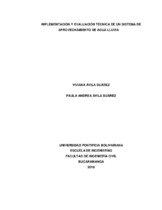| dc.contributor.advisor | Suárez Santos, Jherson Mauricio | |
| dc.contributor.author | Ávila Suárez, Viviana | |
| dc.contributor.author | Ávila Suárez, Paula Andrea | |
| dc.coverage.temporal | 2018 | |
| dc.date.accessioned | 2020-05-15T14:51:02Z | |
| dc.date.available | 2020-05-15T14:51:02Z | |
| dc.date.issued | 2018 | |
| dc.identifier.uri | http://hdl.handle.net/20.500.11912/5389 | |
| dc.description | 87 páginas | spa |
| dc.description.abstract | La escasez de agua a nivel mundial ha llevado a la humanidad a la implementación de sistemas de recolección, almacenamiento y distribución de agua lluvia; en consecuencia, se ha venido implementando este tipo de sistemas como respuesta a la escasez y la imposibilidad de acceder al agua. Este proyecto tiene como objetivo la implementación, toma de datos en campo y evaluación técnica de un sistema de aprovechamiento de agua lluvia. La construcción se realizó con base en
un diseño ya existente y se evidencia el correcto funcionamiento del sistema de captación de agua lluvia. La evaluación técnica permite evidenciar que en la mitad del año se puede suplir la demanda de agua mediante agua lluvia, pero solo para fines no potables; en contexto, para una dotación
neta total en una vivienda de 4 habitantes de estrato 1 y 2, se estima que 6,72 m3/mes equivalen al 40% de ahorro de consumo de agua potable. El análisis de datos de campo estima que aproximadamente en 11 y 7 años se ve recuperada la inversión inicial de un sistema de aprovechamiento de agua lluvia para estratos 1 y 2 respectivamente. | spa |
| dc.description.abstract | The worldwide water shortage has led humanity to the implementation of rainwater collection, storage and distribution systems; consequently, this type of systems has been implemented in response to the scarcity and inability to access water. The objective of this project is the
implementation, data collection in the field and technical evaluation of a rainwater harvesting system. The construction was carried out based on an existing design and the correct functioning of the rainwater collection system is evident. The technical evaluation reveals that in the middle of
the year the demand for water can be met by rainwater, but only for non-potable purposes; in context, for a total net provision in a house of 4 inhabitants of strata 1 and 2, it is estimated that 6.72 m3 / month is equivalent to 40% of consumption savings of drinking water. The analysis of field data estimates that approximately the first investment of a rainwater harvesting system for strata 1 and
2, respectively, is recovered in approximately 11 and 7 years. | eng |
| dc.format.mimetype | application/pdf | |
| dc.language.iso | spa | |
| dc.publisher | Universidad Pontificia Bolivariana | spa |
| dc.rights | Attribution-NonCommercial-NoDerivatives 4.0 International | * |
| dc.rights.uri | http://creativecommons.org/licenses/by-nc-nd/4.0/ | * |
| dc.subject | Aguas lluvias | spa |
| dc.subject | Construcción | spa |
| dc.subject | Agua potable | spa |
| dc.subject | Desarrollo sostenible | spa |
| dc.title | Implementación y evaluación técnica de un sistema de aprovechamiento de agua lluvia | spa |
| dc.type | Trabajo de grado | spa |
| dc.publisher.department | Escuela de Ingenierías | spa |
| dc.publisher.program | Ingeniería Civil | spa |
| dc.type.hasVersion | publishedVersion | spa |
| dc.description.sectional | Bucaramanga | spa |
| dc.description.degreename | Ingeniero Civil | spa |


